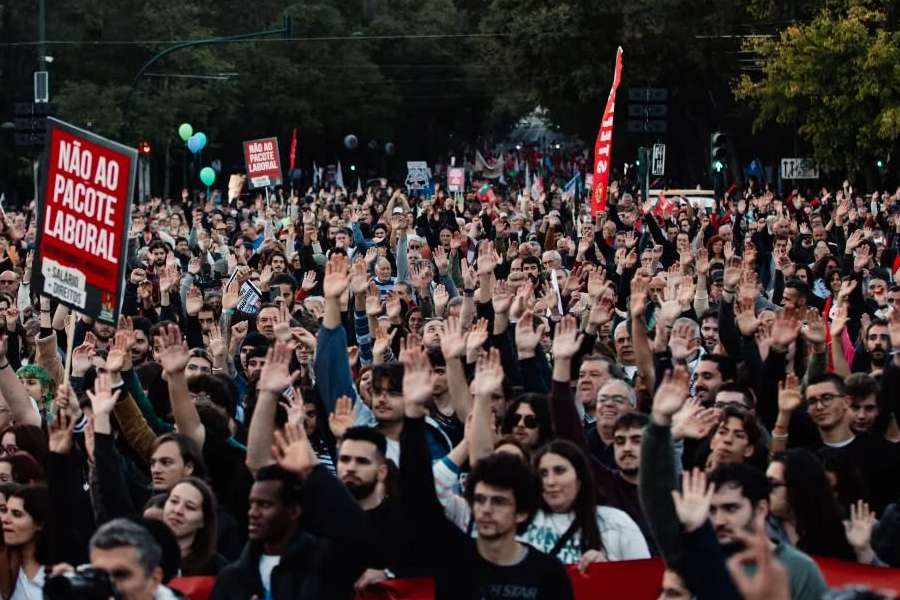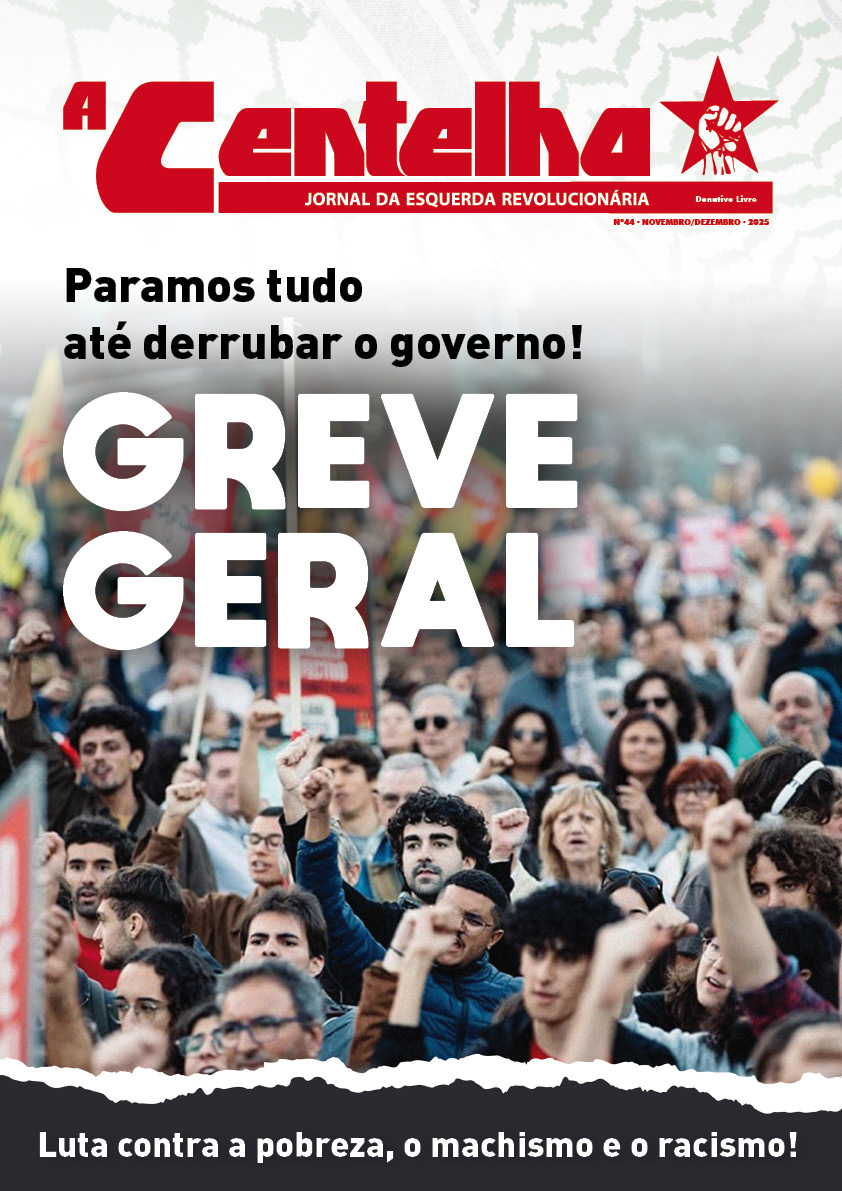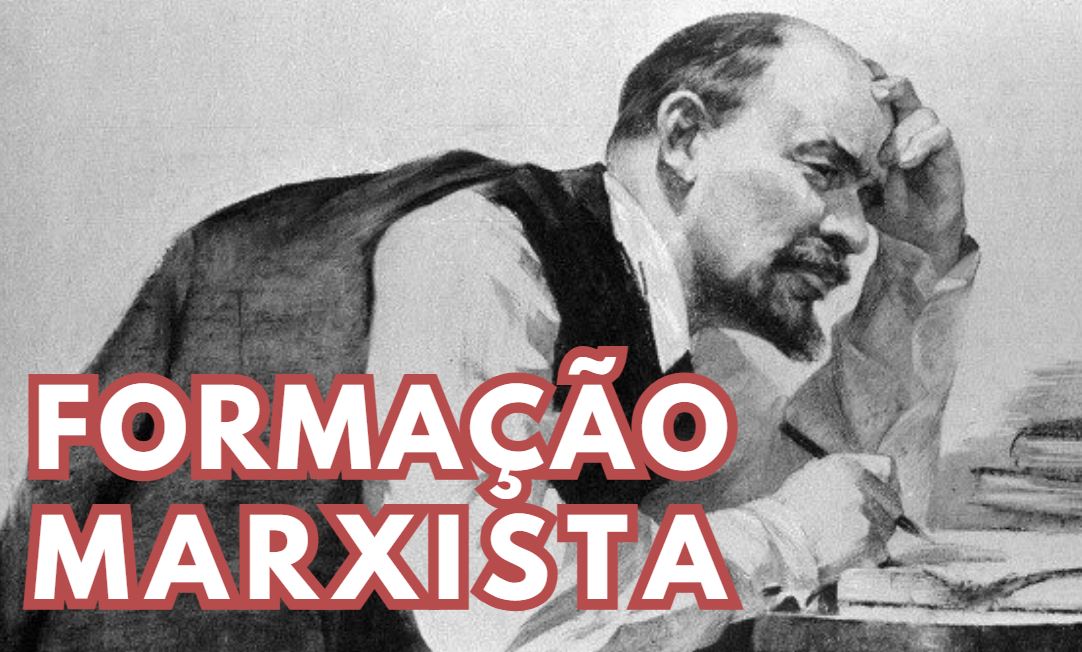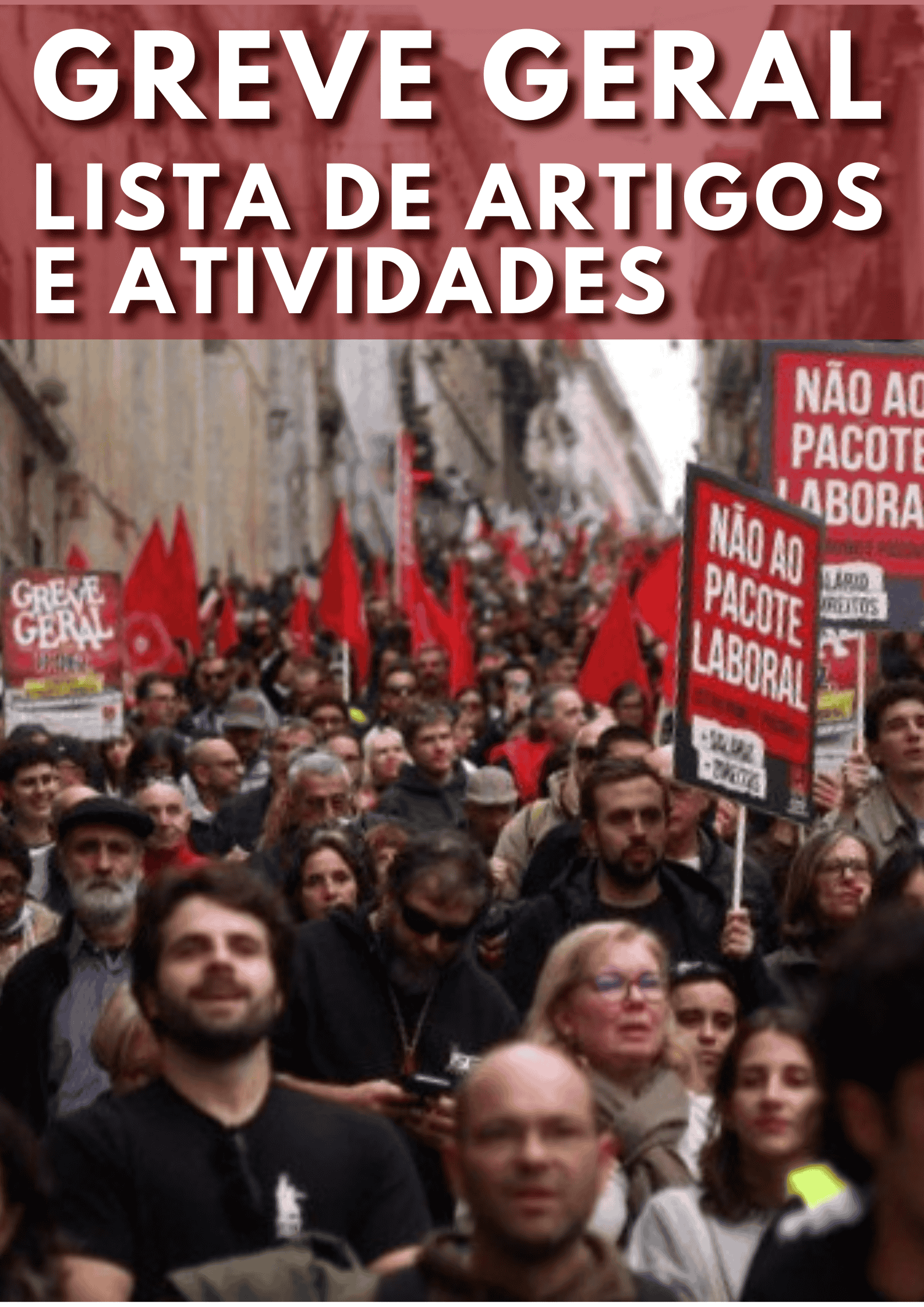On November 8, 100,000 of us filled Avenida da Liberdade and the surrounding streets to stop the government’s offensive against labour and trade-union rights. The government’s “Labour Package” is the worst attack on labour and union rights since the Portuguese Revolution, one that would drag us back to the precarity and lack of protections of the early twentieth century. It was a massive and combative demonstration, showing the determination and strength of the organised working class in resisting this government of capital.
This display of strength — reflecting the enormous pressure from below that the union bureaucracy now faces after years of maintaining “social peace”, which brought only setbacks for workers and encouraged employers and the far right — culminated in the announcement of a general strike for December 11 by both CGTP and UGT.
The intense media campaign by the bourgeoisie, echoed as well by the institutional and reformist left, which claims that the entire working class and youth are shifting to the right, only aims to demoralise us and hide reality. The call for this general strike is an event of great importance: after more than a decade without such a call, it shows that polarisation is also expressing itself on the left, with the potential to decisively change the political situation through the entry into action of the working class and of a precarious and impoverished youth. It is in strikes and in mass mobilisations that we demonstrate and recognise our real strength.
On December 11 we have a historic opportunity to deal a serious blow to the right and the far right, to reclaim the streets, to stop the attacks, and to advance toward a phase of offensive struggle for labour, social, and democratic rights.
The Axes of the Government’s Reactionary Offensive
Since taking office, the AD government has wasted no time acting as an instrument of the most reactionary wing of the bourgeoisie, eager to cut labour and democratic rights in order to guarantee rising profit rates. Now, with the absolute-majority support of the right and far right in parliament — and faced with the collapse of the reformist left — the government has advanced in this legislative term in a far more determined way than in the previous one, expanding the attacks that began against immigrant workers to the entire working class. These attacks have followed one another so rapidly that it would be impossible to include them all in this editorial, but they can be grouped into three major axes.
The first is the dismantling of labour and trade-union rights for all workers. The “Work XXI” proposal (“Labour Package”) amends 110 articles of the Labour Code (and nine complementary statutes) and aims to make dismissals easier—including without just cause!—as well as to expand lay-offs, deregulate working hours, increase precarious contracts, and facilitate the expiry of collective agreements. Rights related to parenthood are also attacked, from reducing breastfeeding hours to obliging parents to work on weekends. Unionisation and union propaganda in workplaces are made difficult or outright blocked. Even the right to strike is undermined through the imposition of a fixed percentage of minimum-service requirements — which, in practice, sabotages strikes by preventing workers from stopping work collectively. Behind the neoliberal clichés of “flexibility”, “efficiency”, and “cutting red tape”, employers seek to turn workers into precarious and atomised individuals at the mercy of their whims, hiring and firing as they wish and deciding working hours and holidays without any legal constraints. A regression to the labour conditions of the early twentieth century!
The second axis is the destruction or privatisation of public services and the dismissal of public employees. The government intends to remove nearly one billion euros from the already-degraded National Health Service (SNS) in the 2026 State Budget and to reorganise Recovery and Resilience Plan (PRR) funds so as to cut hundreds of millions of euros from healthcare, education, and public transport. It is moving forward with the privatisation of TAP and has set its sights on a series of public companies that escaped the privatisation wave under the PSD-CDS government of Passos Coelho — its ideological predecessor — and which, because they are profitable or compete with private interests, are highly coveted by private capital. Even Social Security is at risk: billions of euros coveted by pension funds and other private interests for investment and speculation, threatening pensions and other social supports. The government has launched a “State Reform,” a covert mechanism for dismissing public employees and redirecting funding toward institutions that serve bourgeois interests, again under the pretext of “greater efficiency”. The first victims were 18 bodies under the Ministry of Education, Science, and Innovation, including the Foundation for Science and Technology, responsible for scientific funding.
The third axis, the most violent, is the radicalisation of attacks on the rights of immigrant workers. The fundamental aim is to make the acquisition of nationality more difficult so as to keep this vital segment of the working class—almost 1.5 million people—without rights and trapped in jobs with miserable conditions. For this reason, the government changed the “Nationality Law” to increase the requirements for obtaining nationality, such as lengthening the required residence period or demanding greater knowledge of the language and culture. There is also another key objective: to divide the working class along national and racial lines and to normalise the idea that low wages, attacks on labour rights, and crises in housing, the SNS, etc., are not the responsibility of the bourgeoisie but of immigrants. These attacks are reinforced by a powerful propaganda campaign aimed at criminalising and dehumanising immigrant workers. The “perception of insecurity” has been manufactured by the bourgeoisie’s mouthpieces in the media in a country that is one of the safest in the world, in order to press forward with the destruction of rights and the strengthening of the state’s repressive apparatus. The government swiftly approved the construction of detention centres and rapidly passed a new “Foreigners’ Law” that creates a police force — UNEF, expected to reach 1,600 agents — to terrorise, detain, and expel immigrants from the country, just as ICE does in the United States.
For this offensive, the PSD-CDS government counts on the full support of Chega. The PSD-CDS leaders who for years swore up and down that they would never cross the “red line” of governing with Chega’s support quickly reneged on their promises in the face of the latest electoral results. But this is not a case of them having capitulated to or adopted Chega’s programme, as parts of the left claim. This has been the PSD-CDS programme for decades—they simply lacked the conditions to implement it. Such was already the case under the Passos Coelho government, which was able to press forward with its attacks thanks to support from European and international bourgeois institutions—going even further than the Troika demanded. Now, it advances supported by the rise of the far right in Portugal and the West, especially by its leader Donald Trump, whose second-term programme it has photocopied.
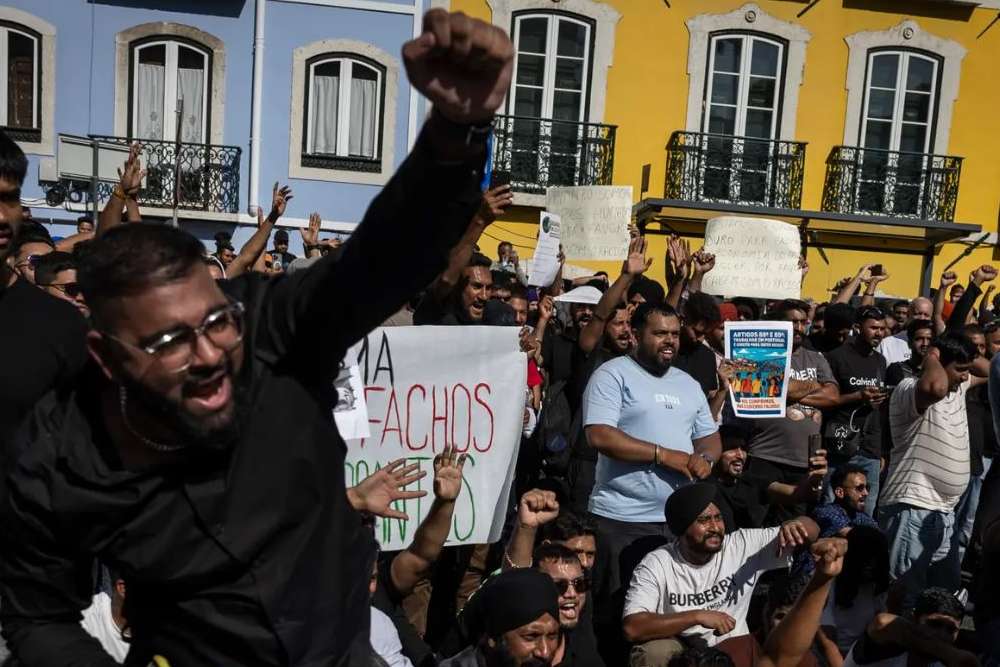
Build the General Strike and Fill the Streets on December 11!
The government’s attacks target us — workers already precarised and impoverished, who never recovered from the assaults of the Passos Coelho government and, to a large extent, maintained under António Costa. According to CGTP data, 1.3 million workers are in precarious employment and 1.9 million have deregulated working hours. Low wages, the worst housing crisis in the OECD, and inflation provoked by monopolistic price-setting mean that we are one of the poorest working classes in Europe, and one where the gap between the wage needed for a dignified life (above €1600) and the minimum wage (€870) is the widest. Two million people live in poverty, many of them despite having jobs.
If the changes in the “Labour Package” go ahead, the degrading conditions we already face would become unbearably worse. We workers know this, just as we know that the scale of the government’s attacks can only be met with an adequate response: organisation from below and the strongest possible general strike. As demonstrated on November 8, there is determination to reverse this brutal assault. To succeed, it is necessary to organise this general strike and a massive national demonstration in Lisbon using the appropriate methods: organising from the base through strike committees and mass assemblies that gather all workers in each workplace to drive the strike; discussing and voting democratically, without sectarianism between unions or distinctions between occupational categories; carrying out widespread agitation in all workplaces and neighbourhoods; and forming pickets to block scabs, convince other workers to join, and prevent employers—who will threaten and try to repress us harshly—from undermining our rights.
Defeating the “Labour Package” would already be an important victory, but we must also resist the attacks on our immigrant brothers and sisters. An attack on one part of the working class is an attack on the entire class, and these workers have immense potential for struggle due to their hyper-exploitation and their condition as second-class citizens. We caught a glimpse of their tremendous strength on September 17, when more than 5,000 people demonstrated outside the Assembly of the Republic. Including their demands and calling immigrant organisations—as well as independent unions and other combative organisations—to participate in building the General Strike would bring crucial strength and enthusiasm to the struggle of the entire working class.
The bourgeoisie and the government fear the power of our class, which is why the pressure to stop the General Strike is enormous. But we cannot give in. On the contrary, the best guarantee of defeating their attacks lies in the most massive mobilisation possible on December 11, and in building a rising plan of struggle beyond that day, with demands that address the real problems of the population. Not only stopping the current attacks, but reversing previous reforms, winning wage increases, nationalising strategic sectors under workers’ control, guaranteeing quality public services, ending militarist policies, and reversing all authoritarian and repressive measures imposed against democratic rights.
Only mass struggle in the workplaces and in the streets can reveal the real strength of our class and force reaction to retreat. It was the international mass movement for an end to the genocide of the Palestinian people — with its gigantic demonstrations and general strikes that began to threaten the stability of governments complicit in the genocide—that forced the genocidal states of the United States and Israel to manoeuvre and present a false “peace plan” in an attempt to demobilise that movement. In Portugal, we too saw huge mobilisations: the April 25 marches, the LGBTI+ Pride and antifascist demonstrations, and especially those for Palestine. If the far right did not dare to take to the streets for months, it was because they were driven out by those large and combative mobilisations against the Zionist genocide — especially in the days following the kidnapping of members of the Global Sumud Flotilla, when thousands of people occupied and blocked the main streets of Lisbon and Porto.
A plan of struggle that goes further — and takes the December 11 general strike as a first step — is the way to reverse the attacks and social and labour setbacks, as well as the growing advance of the far right. Until this call was issued, the offensive of the right and far right had faced no resistance from a reformist left in crisis, which placed all its hopes in parliamentary cretinism, effectively abandoning militant organisation and street struggle.
If they wish to play any role, the leaderships of the Left Bloc (BE) and Communist Party (PCP) now have a new opportunity. They must trust the working class, take to the streets, and organise in a unified, democratic, and non-sectarian way the enormous mobilisation potential that exists — supporting and driving the movement, and adopting a policy that truly confronts the major centres of economic power instead of settling for the lesser evil. They must abandon their hope that the PS will lead the opposition in Parliament and their inclination to align with it, as the BE did in the Lisbon municipal elections. The historical era of European social democracy has ended: with the growing loss of the European bourgeoisie’s position in relation to the major imperialist blocs, they are no longer willing to offer crumbs to the working class. It is time for an open class struggle. And reformist parties that do not radicalise to the left sign their political will under the guise of social democracy.
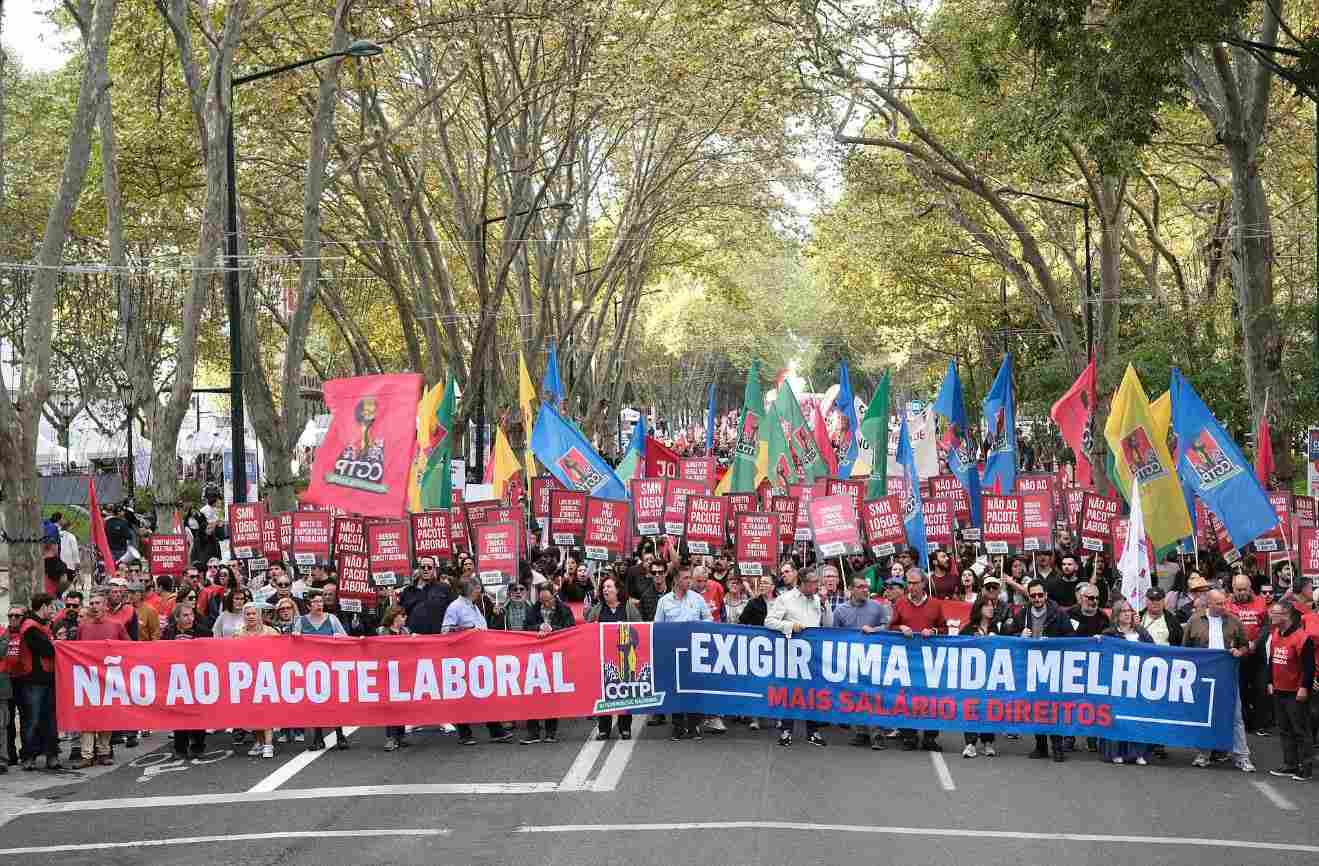
We Need to Build a Revolutionary Alternative!
In the face of the crisis of capitalism and Western imperialism, there is a general tendency for bourgeois governments to intensify their attacks and for the far right to grow. But this, combined with the genocide of the Palestinian people, is fuelling a leftward polarisation internationally. The working class has shown, on countless occasions, that it has both the will and the strength to confront this barbaric system that is capitalism. The problem is not a lack of consciousness on our part. What we need is to build an alternative based on revolutionary Marxism, on the programme of genuine socialism, and on the methods of struggle of the working class. This is the task to which we in Esquerda Revolucionária/Revolutionary Left are committed, and we invite everyone to come discuss and build an anti-fascist, class-based, socialist alternative.
We Fight For:
- Down with the “Labour Package”! End precarious contracts, hour banks, the expiry of collective agreements, etc. Raise the national minimum wage and public-sector wages to dignified levels and reduce the working week to 30 hours.
- Down with the “Nationality Law” and the “Foreigners’ Law”! Equal rights for immigrants and their families, and access to nationality for all who desire it. Abolition of AIMA, UNEF, and all related police bodies.
- Immediate end to all ongoing and planned privatisations (TAP, RTP, etc.). Renationalisation of all privatised public services, hiring more workers, and ensuring full labour rights.
- A fully public, free, and high-quality National Health Service for all; increased funding; immediate hiring of thousands of healthcare workers; and nationalisation of private healthcare.
- Free education from nursery to university and vocational training. End precarious employment in education: permanent contracts for all workers. Nationalisation of private schooling.
- Resolve the housing crisis: expropriation without compensation of real-estate funds, large landlords, and banks. Creation of a national system of public housing with accessible social rents. Halt all demolitions and evictions.
- End sexist violence, patriarchal justice, and queerphobic/transphobic discrimination. Equal pay for equal work. The right to free and accessible abortion within the NHS. Comprehensive sexual education in schools. Full rights for the trans community.
- Down with imperialist wars and militarism! End NATO and the EU rearmament plan! Not one cent for militarism!
- End the genocide of the Palestinian people. Cut all ties between the Portuguese state, its institutions, and Portuguese companies with the genocidal state of Israel.
- Nationalisation without compensation of strategic companies and the entire banking sector, to guarantee the resources needed to implement these measures and to place the enormous wealth accumulated over decades by the capitalists at the service of the well-being of the overwhelming majority of the population.
All out for the general strike on December 11!
Join the Revolutionary Left!






